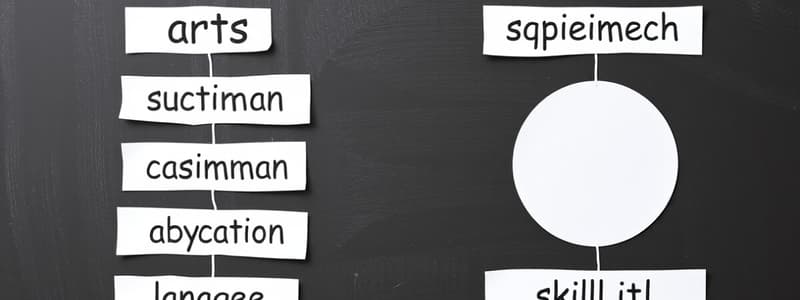Podcast
Questions and Answers
Which type of noun refers to specific names?
Which type of noun refers to specific names?
- Proper Noun (correct)
- Common Noun
- Concrete Noun
- Abstract Noun
What type of verb connects the subject to a complement?
What type of verb connects the subject to a complement?
- Action Verb
- Linking Verb (correct)
- Transitive Verb
- Auxiliary Verb
Which type of sentence contains at least two independent clauses and one dependent clause?
Which type of sentence contains at least two independent clauses and one dependent clause?
- Simple Sentence
- Compound Sentence
- Complex Sentence
- Compound-Complex Sentence (correct)
Which tense indicates actions that will be completed at some point in the future?
Which tense indicates actions that will be completed at some point in the future?
What is the primary function of a comma in a sentence?
What is the primary function of a comma in a sentence?
What role do adverbs typically serve in a sentence?
What role do adverbs typically serve in a sentence?
Which sentence exemplifies a run-on sentence?
Which sentence exemplifies a run-on sentence?
Which of the following is NOT a type of pronoun?
Which of the following is NOT a type of pronoun?
Which punctuation mark is used to end statements?
Which punctuation mark is used to end statements?
What does the use of quotation marks signify in a sentence?
What does the use of quotation marks signify in a sentence?
Which of the following describes a word that connects words or groups of words?
Which of the following describes a word that connects words or groups of words?
Which of the following is an example of subject-verb agreement?
Which of the following is an example of subject-verb agreement?
What is an example of a misplaced modifier?
What is an example of a misplaced modifier?
What distinguishes active voice from passive voice in a sentence?
What distinguishes active voice from passive voice in a sentence?
Flashcards are hidden until you start studying
Study Notes
Parts of Speech
-
Nouns: Names of people, places, things, or ideas (e.g., cat, city, love).
- Types: Proper (specific names), Common (general names), Abstract (ideas), Concrete (physical objects).
-
Verbs: Action or state of being words (e.g., run, is).
- Types: Action (physical or mental actions), Linking (connects subject to complement), Auxiliary (helper verbs).
-
Adjectives: Words that describe nouns (e.g., blue, tall, interesting).
- Comparative (e.g., taller), Superlative (e.g., tallest).
-
Adverbs: Describe verbs, adjectives, or other adverbs (e.g., quickly, very).
- Often end in -ly, but not exclusively.
-
Pronouns: Replace nouns (e.g., he, she, it).
- Types: Personal, possessive, reflexive, relative, demonstrative.
-
Prepositions: Show relationships between nouns and other words (e.g., in, on, at).
- Often indicate direction, time, or location.
-
Conjunctions: Connect words or groups of words (e.g., and, but, or).
- Types: Coordinating, subordinating, correlative.
Sentence Structure
- Simple Sentence: Contains a subject and a verb (e.g., The dog barks).
- Compound Sentence: Two independent clauses joined by a conjunction (e.g., She likes tea, but he prefers coffee).
- Complex Sentence: One independent clause and at least one dependent clause (e.g., Although it was raining, we went for a walk).
- Compound-Complex Sentence: At least two independent clauses and one dependent clause (e.g., Though she was tired, she finished her homework, and she went to bed).
Tenses
- Present Tense: Describes current actions (e.g., I walk).
- Past Tense: Describes actions completed in the past (e.g., I walked).
- Future Tense: Describes actions that will happen (e.g., I will walk).
- Perfect Tenses:
- Present Perfect (e.g., I have walked),
- Past Perfect (e.g., I had walked),
- Future Perfect (e.g., I will have walked).
Punctuation
- Period (.): Ends statements.
- Comma (,): Separates items in a list, clauses, or adjectives.
- Question Mark (?): Ends interrogative sentences.
- Exclamation Point (!): Expresses strong emotion.
- Quotation Marks (" "): Enclose direct speech or quotations.
- Apostrophe ('): Indicates possession or contractions.
Common Grammar Issues
- Subject-Verb Agreement: Subjects and verbs must agree in number (e.g., She runs vs. They run).
- Misplaced Modifiers: Words or phrases that are placed awkwardly in a sentence, leading to confusion.
- Run-on Sentences: Two or more independent clauses incorrectly joined without proper punctuation.
- Fragments: Incomplete sentences that lack a main clause.
Usage
- Active Voice: The subject performs the action (e.g., The cat chased the mouse).
- Passive Voice: The subject receives the action (e.g., The mouse was chased by the cat).
Style and Clarity
- Use clear and concise language.
- Avoid jargon unless necessary.
- Vary sentence structure for engagement.
Parts of Speech
- Nouns: Identify people, places, things, or ideas; categorized as Proper (specific), Common (general), Abstract (ideas), and Concrete (physical).
- Verbs: Indicate action or state; divided into Action (physical or mental), Linking (connects subject to complement), and Auxiliary (helper verbs).
- Adjectives: Describe nouns with qualities; includes forms such as Comparative (e.g., taller) and Superlative (e.g., tallest).
- Adverbs: Modify verbs, adjectives, or other adverbs; typically end in -ly, but may vary.
- Pronouns: Substitute for nouns; encompass Personal, Possessive, Reflexive, Relative, and Demonstrative types.
- Prepositions: Express relationships of nouns with other words, often signifying direction, time, or location (e.g., in, on, at).
- Conjunctions: Link words/groups; includes Coordinating, Subordinating, and Correlative types.
Sentence Structure
- Simple Sentence: Comprises a single subject and verb (e.g., The dog barks).
- Compound Sentence: Combines two independent clauses with a conjunction (e.g., She likes tea, but he prefers coffee).
- Complex Sentence: Features one independent and at least one dependent clause (e.g., Although it was raining, we went for a walk).
- Compound-Complex Sentence: Contains at least two independent and one dependent clause (e.g., Though she was tired, she finished her homework, and she went to bed).
Tenses
- Present Tense: Relates to current actions (e.g., I walk).
- Past Tense: Refers to actions completed in the past (e.g., I walked).
- Future Tense: Discusses actions expected to occur (e.g., I will walk).
- Perfect Tenses:
- Present Perfect: Describes actions completed at some point (e.g., I have walked).
- Past Perfect: Highlights actions completed before another past event (e.g., I had walked).
- Future Perfect: Indicates actions that will be completed by a specific future point (e.g., I will have walked).
Punctuation
- Period (.): Concludes statements.
- Comma (,): Separates items in lists, clauses, or adjectives.
- Question Mark (?): Denotes interrogative sentences.
- Exclamation Point (!): Conveys strong emotions.
- Quotation Marks (" "): Used for direct speech or quotations.
- Apostrophe ('): Indicates possession or contractions.
Common Grammar Issues
- Subject-Verb Agreement: Subject and verb must match in number (e.g., She runs vs. They run).
- Misplaced Modifiers: Phrases positioned awkwardly in sentences may cause confusion.
- Run-on Sentences: Incorrectly fused independent clauses due to lack of punctuation.
- Fragments: Incomplete thoughts lacking a main clause.
Usage
- Active Voice: The subject performs the action (e.g., The cat chased the mouse).
- Passive Voice: The subject receives the action (e.g., The mouse was chased by the cat).
Style and Clarity
- Use clear, concise language.
- Minimize jargon unless essential for understanding.
- Vary sentence structures to maintain reader engagement.
Studying That Suits You
Use AI to generate personalized quizzes and flashcards to suit your learning preferences.




